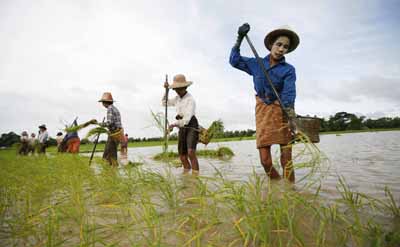Business as Usual
(Page 3 of 4)
It is unlikely that the election will bring real change to the balance of power in Burma, concludes the EIU study, and therefore military manipulation and internal conflict will continue to blight economic development.
Burma’s Empty Rice Bowl
The Irrawaddy delta, Burma’s primary rice-growing region, is potentially the center of any major rice-exporting revival, but it is still languishing after the devastation of Cyclone Nargis in 2008.
 |
| Farmers plant rice seedlings in a paddy field on the outskirts of Rangoon. (Photo: Reuters) |
“The termination of the TCG is just the latest in a long line of actions taken by the Burmese regime to restrict and control foreign access and assistance to Nargis-affected areas,” Turnell said.
“Two years after Nargis, the situation of most people in affected areas remains precarious. This is especially the case with respect to failures in the recreation of livelihoods,” he said.
He attributed this failure in large part to the junta’s “sustained harassment, including imprisonment, of local people and organizations” involved in the relief effort.
The failure to revive the economy and well-being of the Nargis-afflicted areas is illustrated by the parsimonious help given by the junta, Turnell said.
In 2008-09, he has calculated, Burma’s regime spent US $85 million on post-Nargis reconstruction—just one-seventh of the funds spent by the regime on its new fighter planes, and a mere two weeks’ worth of the foreign exchange revenue from Burma’s gas exports.
Ten Ways to Better Economic Health
The United States Institute for Peace think tank offers 10 suggestions to a post-election government in Burma to improve the country’s floundering economy:
1. Boost the agriculture sector: There is no better way to increase employment and raise the standard of living. A sustainable credit system and removing obstacles to exports is critical.
2. Socialize the benefits of extractive industries: Lack of transparency means Burma is earning below-market prices for its gas, timber and other exports. The government’s share of earnings is not flowing to services that make the economy broadly more productive and competitive. An excessive share is being diverted to powerful individuals and groups affiliated with the junta.
3. Devise pro-growth fiscal decentralization: Generous revenue sharing with regions and states can contribute significantly to national reconciliation as well as improve government services at both the central and local levels.
4. Privatize sensibly: Although de-monopolization could yield significant benefits by making the economy more competitive over time, the stifling political economy could undermine effectiveness in the near term by rewarding military actors.
5. Carefully target and condition foreign aid and investment: Without a defensive strategy for dealing with an outpouring of interest from aid donors and private investors, it will be difficult for the government to adopt coherent policies for sustainable economic growth.
6. Address critical infrastructure bottlenecks: The most critical need appears to be reliable electric power in cities and towns, followed by access to the global communications network, i.e., mobile telephones and the Internet. Other needs include highways to Thailand, China, Bangladesh and India, ports to reduce shipping costs, farm-to-market roads and facilities that encourage tourism.
7. Improve macroeconomic management: Improving statistics, especially completing a credible census (the last one was in the 1930s), is a critical step. It will be hard to achieve a flourishing democracy without disciplined fiscal and monetary policies. Strengthening the institutional capacity of the central bank is necessary to achieve the high rate of private-sector savings required to boost domestic investment.
8. Properly fund the armed forces: Adequate funding is essential to discourage individual units from engaging in economic activities that misuse resources. If the size of the army can be reduced as part of national reconciliation, a substantial commitment of budget resources may be required to facilitate a partial demobilization.
9. Fix the financial system: No part of the financial system is working close to international standards. The payment system is rudimentary. Commercial banking is severely repressed.
« previous 1 | 2 | 3 | 4 next page »
